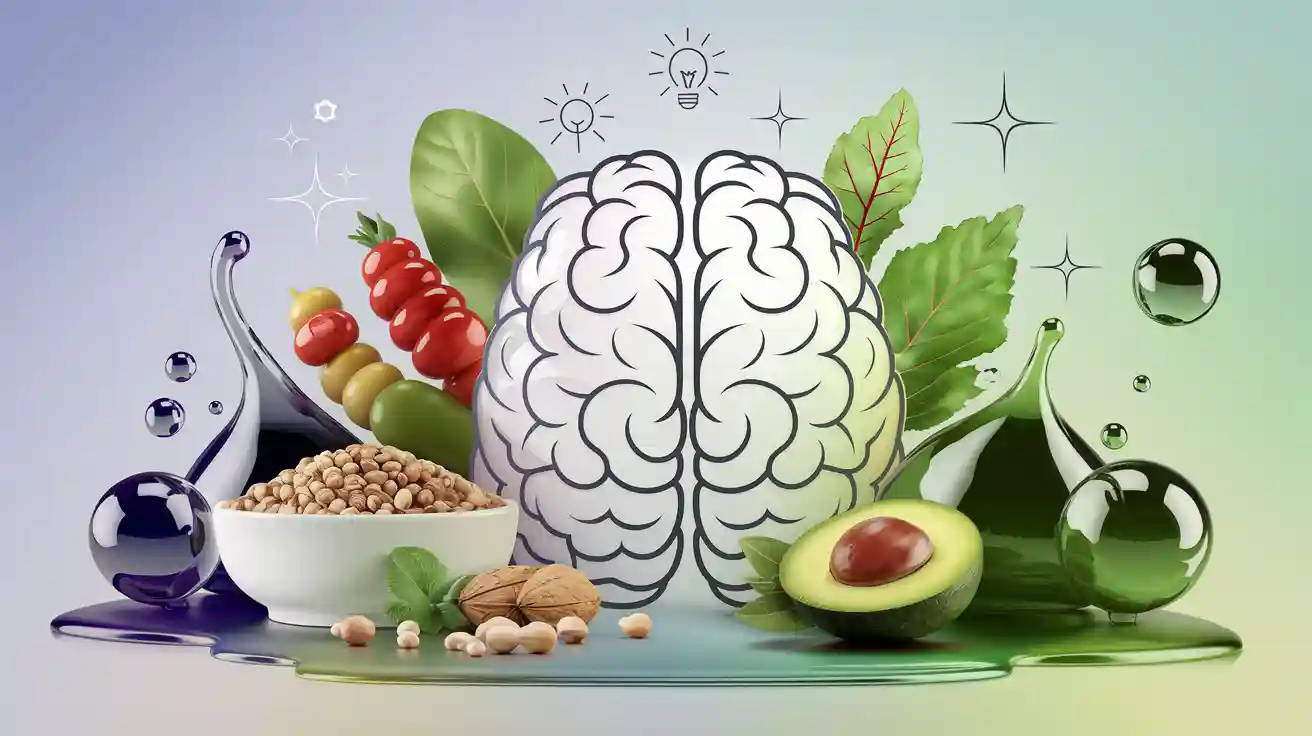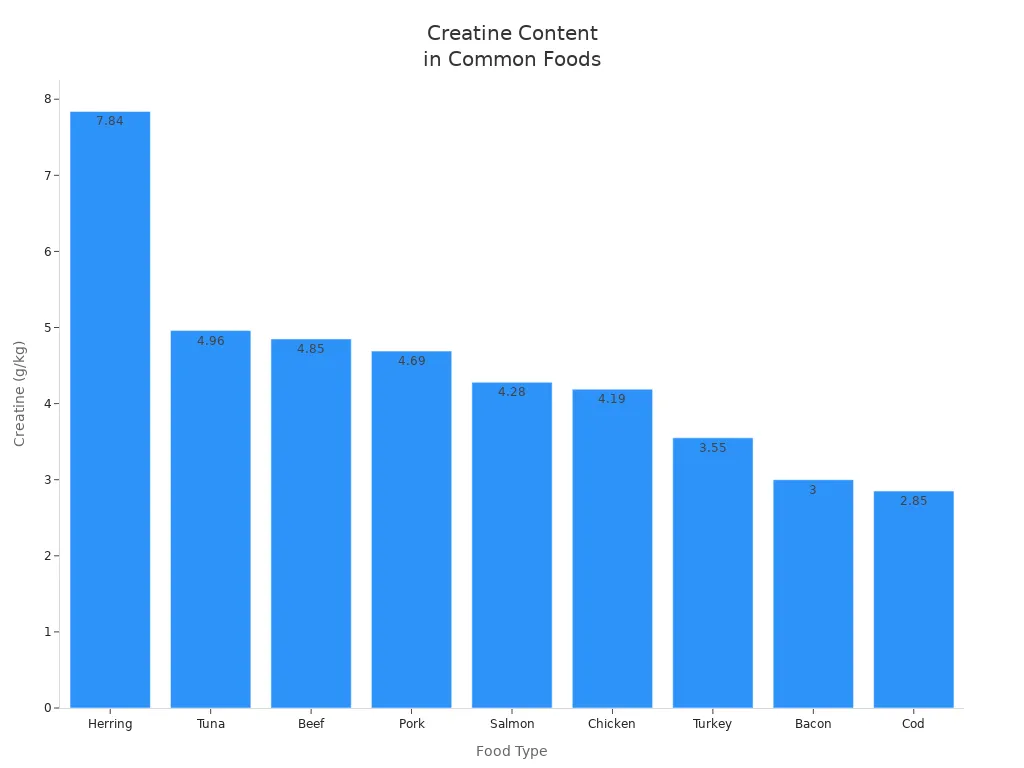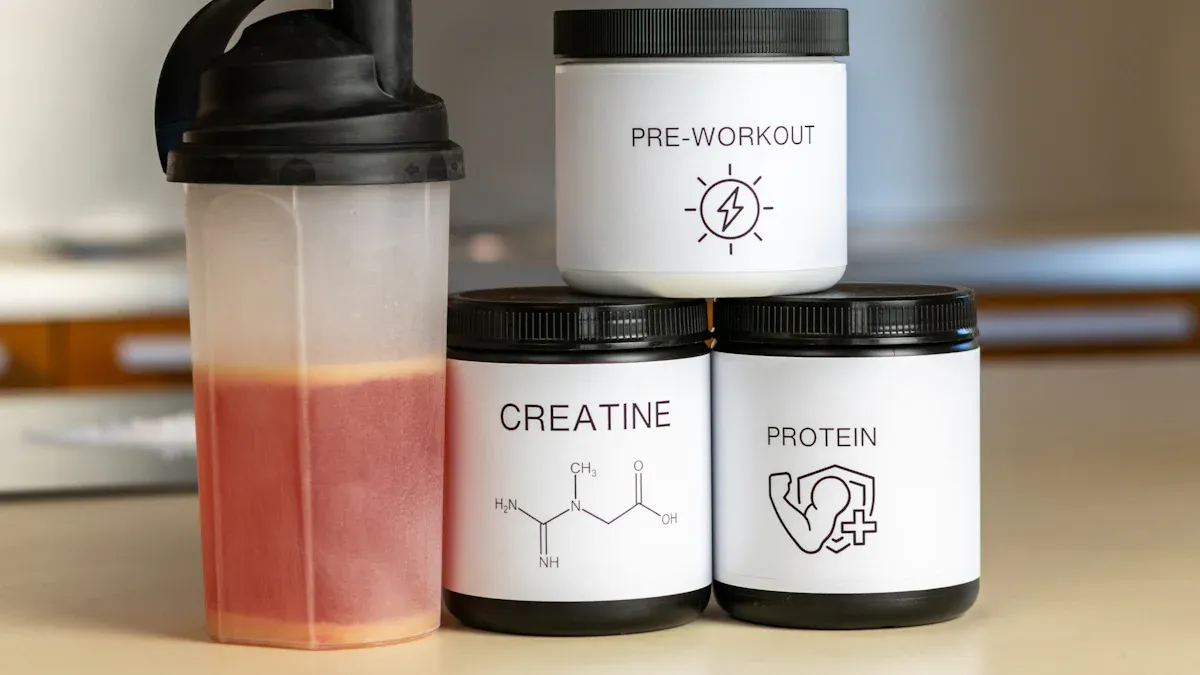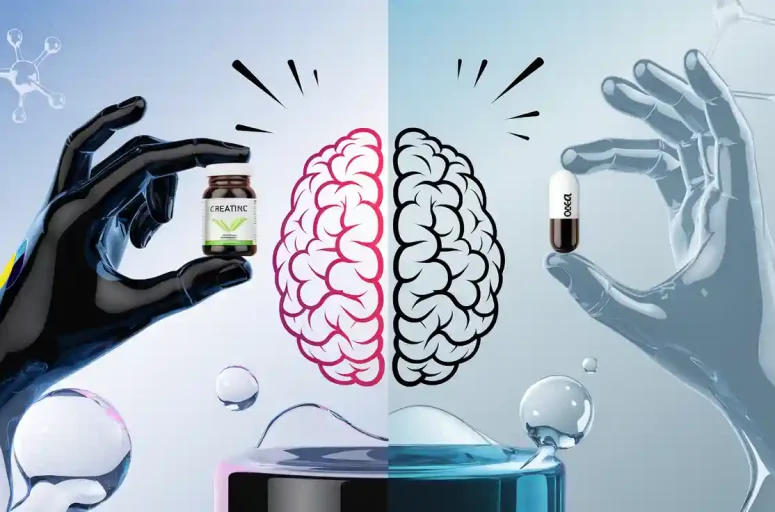
You may not realize it, but if you follow a vegetarian diet, your levels of Vegetarian Creatine are likely much lower than those of people who eat meat. Studies show that vegetarians have up to 50% less creatine in plasma, with similar reductions in muscle and red blood cells. This matters for brain health. Research links Vegetarian Creatine to sharper memory, better attention, and faster information processing. When you support your brain’s energy needs with Vegetarian Creatine, you help maintain mental clarity and overall health. As you read, consider how your diet choices might affect your brain’s performance.
Key Takeaways
Vegetarians often have lower creatine levels, which can affect brain health and cognitive function.
Creatine supports energy production in the brain, helping with memory, attention, and processing speed.
Supplementing with vegetarian creatine can improve mental clarity and reduce mental fatigue.
High-quality vegetarian creatine supplements are available and can benefit both vegetarians and vegans.
Creatine may help alleviate symptoms of depression and improve overall mood.
Older adults and students in high-demand situations can particularly benefit from creatine supplementation.
Daily doses of 3-5 grams of creatine are generally safe and effective for most people.
Consult a healthcare provider before starting any new supplement, including vegetarian creatine.
What Is Creatine?
Definition
Creatine is a compound that your body uses to help supply energy to your cells. You make creatine from amino acids, mainly glycine and arginine. This process happens in your kidneys and liver. The synthesis of creatine follows a two-step pathway:
First, your body combines glycine and arginine to form guanidinoacetate. This step uses the enzyme l-arginine:glycine amidinotransferase (AGAT).
Next, guanidinoacetate moves to your liver, where another enzyme, guanidinoacetate methyltransferase (GAMT), helps turn it into creatine.
S-adenosyl methionine is also needed for this transformation.
Creatine acts as a nitrogenous organic acid. It plays a key role in energy transfer, especially in your muscles and brain. Your body can make some creatine, but you also get it from your diet.
Natural Sources
Most creatine in food comes from animal products. Fish and meat contain the highest amounts. If you eat a vegetarian diet, you miss out on these rich sources. Here is a table showing the creatine content in common foods:
Food | Creatine Content (g/kg) |
|---|---|
Herring | 7.84 |
Beef | 4.85 |
Salmon | 4.28 |
Tuna | 4.96 |
Pork | 4.69 |
Chicken | 4.19 |
Turkey | 3.55 |
Bacon | 3 |
Cod | 2.85 |

You can see that plant-based foods do not appear on this list. This means that if you follow a vegetarian or vegan diet, you get almost no creatine from what you eat. Your body still makes some creatine, but not enough for peak performance or brain health.
Note: Animal products are the main dietary sources of creatine. If you do not eat these foods, you need to find other ways to support your creatine needs.
Vegetarian Creatine Options
Vegetarian creatine supplements offer a solution. Most vegetarian creatine supplements are synthetic. They do not come from animal sources, so they are suitable for both vegetarians and vegans. When you take a vegetarian creatine supplement, your body absorbs it well. In fact, studies show that vegetarians absorb creatine even better than people who eat meat. After you take a creatine supplement, your blood levels peak in about 60 minutes.
Research shows that vegetarians often start with lower creatine levels. When you use a vegetarian creatine supplement, you can raise your total creatine content more than someone who eats meat. This boost can help your brain and muscles work better.
If you follow a vegetarian or vegan diet, you need to consider creatine supplementation. Your body cannot get enough creatine from plant foods alone. Supplementing with vegetarian creatine helps you reach the levels needed for optimal brain function and energy.
Tip: Choose a high-quality vegetarian creatine supplement. Look for products labeled as vegan or synthetic to ensure they fit your dietary needs.
Medical Disclaimer: This blog provides general information for educational purposes only. You should consult a healthcare provider before starting any new supplement, including creatine.
Creatine and Brain Function
Energy in Brain Cells
Your brain needs a constant supply of energy to work well. Creatine plays a key role in this process. When you use creatine, it enters your brain cells through a special transporter. Inside the cell, creatine changes into phosphorylcreatine (PCr). PCr acts like a battery. It stores energy and gives it to adenosine diphosphate (ADP) to make adenosine triphosphate (ATP). ATP is the main energy source for your brain cells. This process keeps your brain active and alert.
Creatine supplementation increases ATP availability during high-demand situations.
ATP is essential for muscle and brain function, especially when you need to think fast or solve problems.
Higher ATP levels may also help with cell communication and recovery.
When you follow a vegetarian diet, your natural creatine stores are lower. This means your brain may not have enough PCr to keep up with daily demands. By using vegetarian creatine, you help your brain cells make more ATP. This supports your brain function and overall health.
Note: Your brain uses a lot of energy, even when you rest. Creatine helps your brain keep up with this demand, especially during stress or intense thinking.
Cognitive Function Support
Creatine does more than just boost energy. It also supports your cognitive function. Studies show that creatine supplementation can improve memory and intelligence tasks. You may notice better recall and faster thinking when your creatine levels are higher. Some research found that creatine helps most when you face stress, lack of sleep, or mental fatigue.
Cognitive Function Aspect | Standardized Mean Difference (SMD) | 95% Confidence Interval (CI) |
|---|---|---|
0.31 | 0.18 – 0.44 | |
Attention Time | -0.31 | -0.58 to -0.03 |
Processing Speed | -0.51 | -1.01 to -0.01 |
Creatine supplementation is safe for most people. The effects of creatine on attention and executive function are still under study. Young adults may not see big changes, but people under stress or older adults may notice real benefits. If you want to support your cognitive performance, vegetarian creatine can help you reach your goals.
Tip: If you study hard, work long hours, or feel mentally tired, creatine can support your brain function and help you stay sharp.
Mental Fatigue Reduction
Mental fatigue can slow you down and make daily tasks harder. Creatine helps reduce mental fatigue by keeping your brain cells energized. When you use creatine supplementation, you give your brain the tools it needs to recover from stress and stay focused. This is important for your mental health and well-being.
The effects of creatine go beyond energy. Some studies suggest creatine may help with depression and other mental health conditions. Researchers are looking at creatine and depression to see if it can act as a neuroprotective supplement. While more research is needed, early results show promise for people who want to support their mental health.
Creatine supplementation may help reduce symptoms of depression.
The effects of creatine on mental health are still being studied, but many people report feeling better after using it.
Vegetarian creatine offers a safe way to support your brain and mental health, especially if you do not eat animal products.
If you want to protect your brain function and mental health, consider adding vegetarian creatine to your routine. You may notice less mental fatigue, better mood, and improved focus.
Medical Disclaimer: This blog provides general information for educational purposes only. You should consult a healthcare provider before starting any new supplement, including creatine.
Vegetarian Creatine and Cognitive Function
Memory and Reasoning
You rely on your brain every day for tasks that require memory and reasoning. Vegetarian creatine can play a key role in supporting these abilities. When you use creatine supplementation, you help your brain store and release energy more efficiently. This process supports your cognitive function, especially when you face mental challenges.
Researchers have studied the effects of creatine on memory and reasoning in several clinical trials:
A six-week trial tested creatine at 0.03 g/kg body weight. The results showed no significant differences between creatine and placebo groups for most memory and reasoning tasks. However, one study found that creatine improved response inhibition, which helps you control impulses and make better decisions.
Scientists consider creatine supplementation effective and safe for older adults. It may support and improve cognitive outcomes, especially short-term memory and reasoning. Experts recommend more studies to explore its benefits for people with cognitive disorders.
Reviews suggest that creatine may benefit short-term memory and reasoning. Some results show conflicting effects in other areas, such as long-term memory and attention. Interestingly, vegetarians often show better responses in memory tasks compared to meat-eaters.
You may notice that the effects of creatine are most clear in short-term memory and reasoning. If you follow a vegetarian diet, you might see even greater benefits from vegetarian creatine. Your brain can use this extra support to help you remember facts, solve problems, and think quickly.
Tip: If you want to boost your memory and reasoning, consider adding vegetarian creatine to your daily routine. You may notice improvements, especially during times of mental stress or fatigue.
Mood and Mental Clarity
Your mood and mental clarity affect how you feel and perform each day. Low creatine function in the brain links to a higher risk of depression and anxiety. When you use creatine supplementation, you may help protect your mental health and improve your overall well-being.
Here is a summary of research findings on creatine and mood:
Evidence Type | Findings |
|---|---|
Low creatine function | Associated with a greater likelihood of experiencing symptoms of depression and anxiety. |
Creatine monohydrate administration | May alleviate symptoms of mood disorders. |
Population-based research | Established a link between dietary intake of creatine and depression risk in adults. |
Interventional studies | Lower creatine levels in the prefrontal cortex are associated with low mood and increased depression. |
Clinical trials | Creatine supplementation may alleviate symptoms of depression and anxiety. |
Daily administration of creatine | Increased total brain creatine by 8.7% in healthy individuals. |
Supplementation with escitalopram | Improved antidepressant effects in depressed female individuals. |
You can see that creatine supplementation may help reduce symptoms of depression and anxiety. Some studies show that daily use increases total brain creatine, which supports better mood and mental clarity. When you combine creatine with certain antidepressants, you may see even stronger effects.
If you struggle with low mood or mental fatigue, vegetarian creatine could offer real benefits. By supporting your brain’s energy needs, you may feel more alert, focused, and positive.
Note: Always talk to your healthcare provider before starting any supplement, especially if you have a history of depression or other mental health concerns.
Benefits for Vegetarians
Vegetarians often have lower creatine stores than people who eat meat. This difference can affect your brain function, memory, and mental health. When you use vegetarian creatine, you help your brain reach optimal levels for energy and performance.
Studies show several key benefits of creatine supplementation for vegetarians and vegans:
Study Focus | Findings |
|---|---|
Cognitive Function in Vegetarians | Improved cognitive function after creatine supplementation. |
Memory Effects | Greater memory improvement in vegetarians compared to omnivores. |
Brain Creatine Levels | Comparable brain creatine concentrations between vegetarians and meat-eaters. |
You gain several advantages from vegetarian creatine:
Benefits working memory and reaction time.
Particularly effective under mental fatigue and stress, especially for vegetarians.
Improves cognitive performance under stress.
May help preserve cognitive function as you age.
Creatine is also being explored as a treatment for mood disorders, especially depression. Early trials suggest that high-dose creatine may lead to faster and greater improvements in depressive symptoms, especially in women, when used with standard antidepressants.
If you follow a vegetarian or vegan diet, you may benefit more from creatine supplementation than meat-eaters. Your brain can use the extra creatine to support memory, reasoning, and mental health. You may also notice better focus and less mental fatigue during stressful times.
Medical Disclaimer: This blog provides general information for educational purposes only. You should consult a healthcare provider before starting any new supplement, including creatine.
Creatine Stores in Vegetarians

Lower Baseline Levels
If you follow a vegetarian diet, your body stores less creatine than someone who eats meat. You make some creatine in your liver and kidneys, but you do not get much from plant foods. Studies show that vegetarians have about 10% lower creatine concentrations in their skeletal muscle compared to omnivores. This lower baseline can affect your brain and overall health.
Vegetarians often have less creatine in their muscles.
Lower creatine stores may impact memory and cognitive function.
Your brain depends on creatine for energy and mental performance.
You may not notice the effects right away, but over time, low creatine can make it harder for your brain to work at its best. You might feel more tired or have trouble remembering things. Your health and brain function both rely on having enough creatine in your system.
Impact on Brain Health
Creatine plays a big role in your brain’s energy supply. When your creatine stores run low, your brain may not get the energy it needs. This can affect your memory, focus, and overall mental health. Research shows that vegetarians with lower creatine levels may experience changes in cognitive function, especially in memory tasks.
Lower creatine stores in vegetarians may lead to weaker memory performance.
Some studies found that creatine supplementation improved memory in vegetarians, but did not change other cognitive skills like verbal fluency or vigilance.
Your brain needs creatine to support healthy function, especially during stress or mental challenges.
If you want to keep your brain sharp, you need to pay attention to your creatine levels. A healthy brain depends on a steady supply of energy, and creatine helps deliver that energy.
Supplementation Effects
Creatine supplementation can help you raise your creatine stores to healthy levels. When you take a vegetarian creatine supplement, your body absorbs it well and your brain benefits from the extra energy. Recent research found a small beneficial effect of creatine supplementation on cognitive performance. In one study, vegetarians did not show greater benefits than omnivores, but both groups saw some improvement.
Creatine supplementation led to better scores on memory tests, such as the Backward Digit Span.
No significant improvement was seen in other tests, like Raven’s Advanced Progressive Matrices.
Some people reported more side effects with creatine supplementation than with a placebo, but most effects were mild.
You may notice the effects of creatine most in your memory and mental energy. The effects of creatine on other brain functions are still being studied. If you want to support your brain health, creatine supplementation offers a safe and effective option, especially if you follow a vegetarian diet.
Note: Always talk to your healthcare provider before starting creatine supplementation. Your health and safety come first.
Medical Disclaimer: This blog provides general information for educational purposes only. You should consult a healthcare provider before starting any new supplement, including creatine.
Who Should Consider Vegetarian Creatine?
Vegetarians and Vegans
If you follow a vegetarian diet or vegan lifestyle, you likely have lower creatine stores than people who eat meat. Your body makes some creatine, but plant foods do not provide enough to meet your needs. Research shows that vegetarians and vegans often lack adequate creatine in their diets. This makes you a prime candidate for creatine supplementation. When you add creatine to your routine, you may notice better workout performance and higher energy levels. Many vegetarian athletes use creatine supplementation to support their training and recovery. You can benefit from creatine whether you want to improve your physical strength or boost your mental focus. If you feel tired or struggle with memory, creatine supplementation can help you reach your best.
Tip: If you follow a vegetarian diet, consider creatine supplementation to support both your brain and body.
Older Adults
As you age, your brain needs more support to stay sharp. Creatine plays a key role in brain energy metabolism. Higher brain creatine levels link to better memory, attention, and mental processing speed. You may notice that your memory is not as strong as it once was. Creatine supplementation can help you maintain cognitive health and slow down age-related decline. Studies show that creatine supplementation increases brain creatine and phosphocreatine levels. This boost can improve cognitive processing, especially if you experience sleep deprivation or mental fatigue.
Creatine may enhance memory, attention, and processing speed.
It supports energy metabolism in the brain.
Higher brain creatine levels are linked to better neuropsychological performance.
Creatine supplementation can improve cognitive function in older adults.
More research is needed, but current findings are promising.
If you want to keep your mind active and alert, creatine supplementation offers a safe and effective option. You can use it to support your brain health as you age.
Students and High-Demand Situations
Students and people in high-demand mental situations often face long hours of study or work. You may feel mentally drained or have trouble focusing. Creatine supplementation can help you stay sharp during these times. Studies show that creatine improves cognitive performance, especially when you do not get enough sleep. After taking creatine, your brain metabolism changes within hours, and your cognitive performance peaks soon after. You may notice better processing capacity and stronger short-term memory.
Creatine supplementation enhances cognitive performance in sleep-deprived individuals.
High doses of creatine improve cognitive ability during mental stress.
Positive changes in brain metabolism appear within hours of creatine intake.
Key improvements include processing speed and short-term memory.
If you are a student or work in a demanding job, creatine supplementation can help you perform at your best. Many vegetarian athletes also use creatine to support both physical and mental performance during competitions and exams.
Note: Always talk to your healthcare provider before starting creatine supplementation, especially if you have health concerns.
Medical Disclaimer: This blog provides general information for educational purposes only. You should consult a healthcare provider before starting any new supplement, including creatine.
Safety and Supplementation
Is It Necessary?
You might wonder if creatine supplementation is necessary for your plant-based diet. If you follow a vegetarian or vegan lifestyle, your body does not get creatine from food. Plant-based foods do not contain creatine, so your levels may be lower than those of people who eat meat. Studies show that vegetarians and vegans often have reduced creatine stores. This can affect your energy, memory, and mental performance. Creatine supplementation can help you reach healthy levels and support your brain and body. Vegetarian athletes, in particular, may benefit from creatine supplementation because their diets lack natural sources. If you want to experience the benefits of creatine, such as improved memory and focus, you should consider adding creatine supplementation to your routine.
Tip: If you feel tired, forgetful, or want to boost your mental performance, creatine supplementation may help you reach your goals.
Dosage and Safety
You need to know how much creatine to take and how to use it safely. Most experts recommend a daily intake of 3-5 grams of creatine monohydrate. Some people start with a loading phase, taking 20 grams per day divided into four doses of 5 grams each for about a week. After this phase, you switch to a maintenance dose of 3-5 grams per day. This method helps your body absorb creatine quickly and maintain healthy levels.
Recommended daily intake: 3-5 grams of creatine monohydrate
Loading phase: 20 grams per day (4 doses of 5 grams) for 5-7 days
Maintenance phase: 3-5 grams per day
Creatine supplementation is safe for most people when you follow these guidelines. Long-term studies show that creatine monohydrate does not harm healthy adults. However, taking too much creatine during the loading phase may cause bloating or stomach discomfort. You should always listen to your body and adjust your dosage if you notice side effects.
Here is a table of potential risks and contraindications:
Risk/Contraindication | Description |
|---|---|
People with kidney disease should avoid creatine due to increased creatinine levels. | |
Pregnancy/Breastfeeding | Not enough information exists on creatine safety for pregnant or breastfeeding individuals. |
Medication Interactions | Use caution if you take other medications, vitamins, or energy drinks. |
Note: Always talk to your healthcare provider before starting creatine supplementation, especially if you have health concerns.
Choosing a Supplement
When you choose a vegetarian creatine supplement, look for quality and safety. The FDA sets guidelines for dietary supplement labeling, including creatine products. Manufacturers must follow Current Good Manufacturing Practices (cGMPs) to ensure safety and quality. You can also look for third-party certifications on the label. These certifications show that the supplement meets high standards and does not contain unwanted ingredients.
Check for FDA-compliant labeling.
Look for cGMP certification.
Choose products with third-party testing for extra assurance.
Tip: Pick a creatine supplement labeled as vegan or synthetic to match your dietary needs.
Medical Disclaimer: This blog provides general information for educational purposes only. You should consult a healthcare provider before starting any new supplement, including creatine.
You can support your brain and overall health by considering creatine supplementation, especially if you follow a plant-based diet. Research shows that vegetarians may see greater benefits from creatine, such as improved memory, reasoning, and reduced mental fatigue.
Creatine helps your brain produce energy for demanding tasks.
Supplementation can enhance cognitive function and mood.
Most creatine supplements are vegan-friendly and safe for daily use.
Assessment Point | Key Insight |
|---|---|
Baseline creatine level | Vegetarians often have lower levels than omnivores |
Supplement benefits | Greater cognitive gains possible for vegetarians and vegans |
Always consult your healthcare provider before starting any new supplement. This information is for educational purposes only and does not replace professional medical advice.
FAQ
What is vegetarian creatine?
Vegetarian creatine is a synthetic supplement. You can use it to boost your creatine levels without eating animal products. Most brands label it as vegan or plant-based.
Can you get creatine from plants?
You cannot get creatine from plant foods. Your body makes some creatine, but you need supplements to reach optimal levels if you avoid meat and fish.
Is creatine safe for daily use?
You can safely use creatine every day. Most people take 3–5 grams per day. You should talk to your healthcare provider before starting any new supplement.
Will creatine help your memory and focus?
Creatine can support your memory and focus. Studies show that vegetarians may see greater improvements in cognitive tasks after supplementing with creatine.
Do you need a loading phase for creatine?
You do not need a loading phase. You can start with a daily dose of 3–5 grams. Some people use a loading phase for faster results, but it is optional.
Can older adults benefit from creatine?
Older adults may benefit from creatine. You can use it to support memory, attention, and mental processing speed as you age.
Are there any side effects from creatine?
Most people tolerate creatine well. You may notice mild bloating or stomach discomfort. You should stop use and consult your doctor if you experience any serious symptoms.
Medical Disclaimer:
This FAQ provides general information for educational purposes only. You should consult your healthcare provider before starting any new supplement, including creatine.


